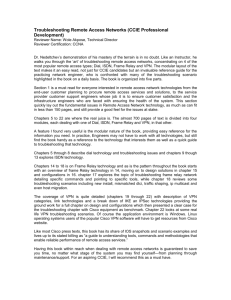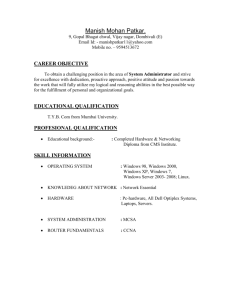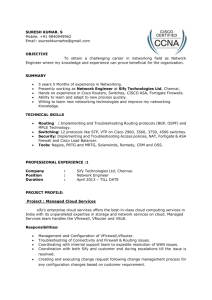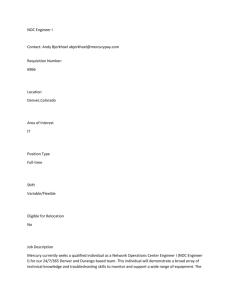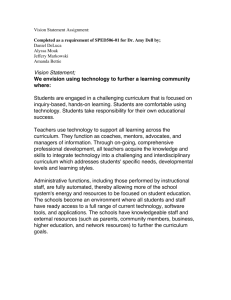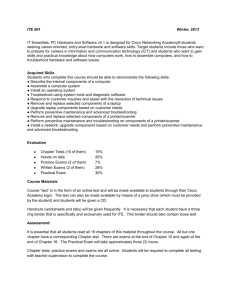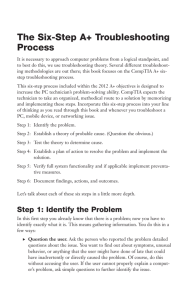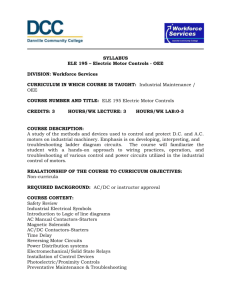Course Description
advertisement
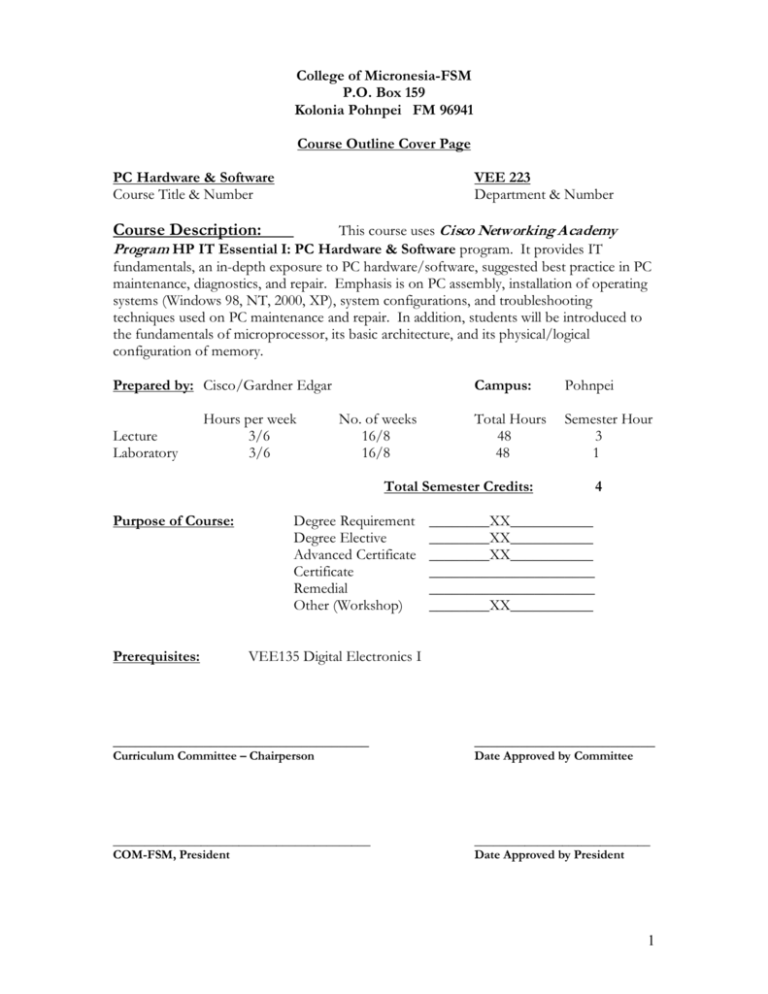
College of Micronesia-FSM P.O. Box 159 Kolonia Pohnpei FM 96941 Course Outline Cover Page PC Hardware & Software Course Title & Number VEE 223 Department & Number Course Description: This course uses Cisco Networking Academy Program HP IT Essential I: PC Hardware & Software program. It provides IT fundamentals, an in-depth exposure to PC hardware/software, suggested best practice in PC maintenance, diagnostics, and repair. Emphasis is on PC assembly, installation of operating systems (Windows 98, NT, 2000, XP), system configurations, and troubleshooting techniques used on PC maintenance and repair. In addition, students will be introduced to the fundamentals of microprocessor, its basic architecture, and its physical/logical configuration of memory. Prepared by: Cisco/Gardner Edgar Lecture Laboratory Hours per week 3/6 3/6 No. of weeks 16/8 16/8 Campus: Pohnpei Total Hours 48 48 Semester Hour 3 1 Total Semester Credits: Purpose of Course: Prerequisites: Degree Requirement Degree Elective Advanced Certificate Certificate Remedial Other (Workshop) 4 ________XX___________ ________XX___________ ________XX___________ ______________________ ______________________ ________XX___________ VEE135 Digital Electronics I __________________________________ ________________________ Curriculum Committee – Chairperson Date Approved by Committee _________________________________________ COM-FSM, President ____________________________ Date Approved by President 1 Learning Outcomes: Upon successful completion of this course, student will be able to: 1. Build, configure, upgrade, and maintain a personal computer system. 2. Diagnose and resolve problems of a personal computer system. 3. Install and configure various computer peripheral devices. 4. Resolve network connectivity problems on a local area network using a systematic troubleshooting approach. 5. Install, configure, upgrade, and maintain Microsoft Windows operating systems. 6. Diagnose and resolve problems using Microsoft Windows system tools. 7. Utilize relevant workplace safety and environmental standards during computer maintenance. 8. Effectively utilize a customer-oriented approach to resolve user problems. 9. Provide computer hardware and software support based upon a set of standard and systematic diagnostic principles. 10. Describe basic microprocessor architecture, physical configuration of memory and the logical configuration of memory. Outline of Content: 1. Information Technology Basic a. Getting started in IT b. Windows Desktop Environment c. Basic Features of Windows d. Overview of Software Applications e. Math for a Digital Age f. Safety Week 1 2. How Computers Work Week 2 a. Introduction to Microprocessor: Basic Architecture & Memory Configurations b. System Overview c. Boot Process d. Hardware Components e. Memory Components f. Display Components g. Connector Components h. Storage Components i. Network Components j. System Resources k. Portable Devices 3. Assembling a Computer a. Overview of the assembly process and safety issues b. Creating a computer inventory c. The computer case and power supply d. Preparing motherboard for installation e. Installing the motherboard Week 3 & 4 2 f. g. h. i. Installing the floppy drive, hard drive, CD-ROM, DVD Video card installation Final steps Booting the system for the first time 4. Operating System Fundamentals a. The operating system b. Disk operating system (DOS) c. Memory management Week 5 5. Windows 9x Operating Systems a. The Windows 9x file structure and file management system b. Windows management with control panel c. System Tools d. Preparing a hard drive for operating system installation e. Installing Windows 9x f. Troubleshooting the installation process Week 6 6. Windows NT/2000 Operating Systems a. Windows 9x contrasts b. System tools c. Overview of the installation process d. Installing the Windows 2000 OS e. Special installation Week 7 7. Windows XP Operating System a. Windows XP versions b. Overview of the installation process c. Installing the Windows XP OS d. Special installations/instructions e. Windows XP and Windows NT/2000/ME/9x contrasts Week 8 8. Multimedia Capabilities a. Introduction to Multimedia b. Upgrading video with a video acceleration board c. Adding audio capabilities with a sound card d. Overview of CD-RW and DVD e. Digitizing Video Week 9 9. Advanced Hardware Fundamentals for Servers a. Network Server Overview b. Hardware-based Raid configuration c. Configuring external peripherals d. Adding hardware to a server e. Upgrading server components Week 10 10. Network Fundamentals a. Introduction to PC networking b. Types of Networks Week 11 3 c. d. e. f. g. h. Adding a network interface card (NIC) Physical components of a network LAN architectures Networking protocols and the OSI model TCP/IP Utilities Connecting to the Internet 11. Printers and Printing a. Understanding printers and printing b. Buying a printer c. Connecting a printer d. Sharing a printer e. Managing a printer f. Dealing with printer problems Week 12 12. Preventative Maintenance and Upgrading Week 13 a. Preventative maintenance and the technician b. Preventative maintenance and electrostatic discharge (ESD) c. Preventative maintenance for computer peripherals d. Preventative maintenance for computer software 13. Troubleshooting PC Hardware a. Troubleshooting basics b. Troubleshooting the hardware box c. Troubleshooting peripheral devices Week 14 14. Troubleshooting Software Week 15 & 16 a. Role of end user b. DOS troubleshooting issues c. Common Windows operating system problems d. Windows 9x troubleshooting problems e. Using system tools and system editor to troubleshoot Windows 9x/2000/XP f. Windows 9x/2000/XP registry problems g. Windows NT/2000 troubleshooting problems h. Troubleshooting Windows XP i. Troubleshooting applications j. Windows data backup and recovery k. Windows-specific printer software problem troubleshooting l. Windows-specific networking software connection troubleshooting m. Windows 9x, NT, 2000, and XP help Method of Instructions: Cisco web-based course materials [http://www.cisco.com/web/learning/netacad/index.html] 2. Hands-on lecture 3. In-class lab with instructor’s guidance and assistance 4. Demonstration 1. 4 Required Course Materials: 1. Minimum student materials a. Notebook b. Student disk/CD 2. Minimum instructional facilities a. Computers with access to a LAN b. Hand tools c. Operating system CDs with utility software d. Classroom computer lab with ESD mat Text and Reference: q Cisco Networking Academy Program HP IT Essentials I: PC Hardware and Software Companion Guide, with supplemental CD­ROM (Cisco Press) q Cisco Networking Academy Program HP IT Essentials I: PC Hardware and Software Lab Companion (Cisco Press) q Cisco Networking Academy Program HP IT Essentials I: PC Hardware and Software Engineering Journal and Workbook (Cisco Press) Attendance: COM­FSM Attendance Policy will apply Honesty: COM­FSM Honesty Policy will apply 5
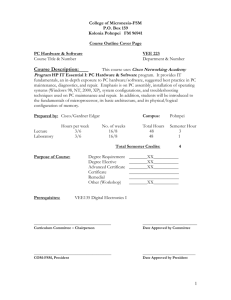
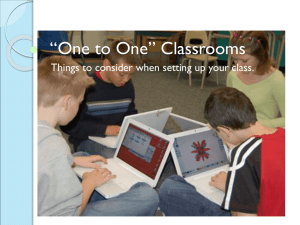
![Computer System Architecture [Opens in New Window]](http://s3.studylib.net/store/data/008592939_1-4f5ce0497d54935af6e3cd73e5af83bf-300x300.png)
